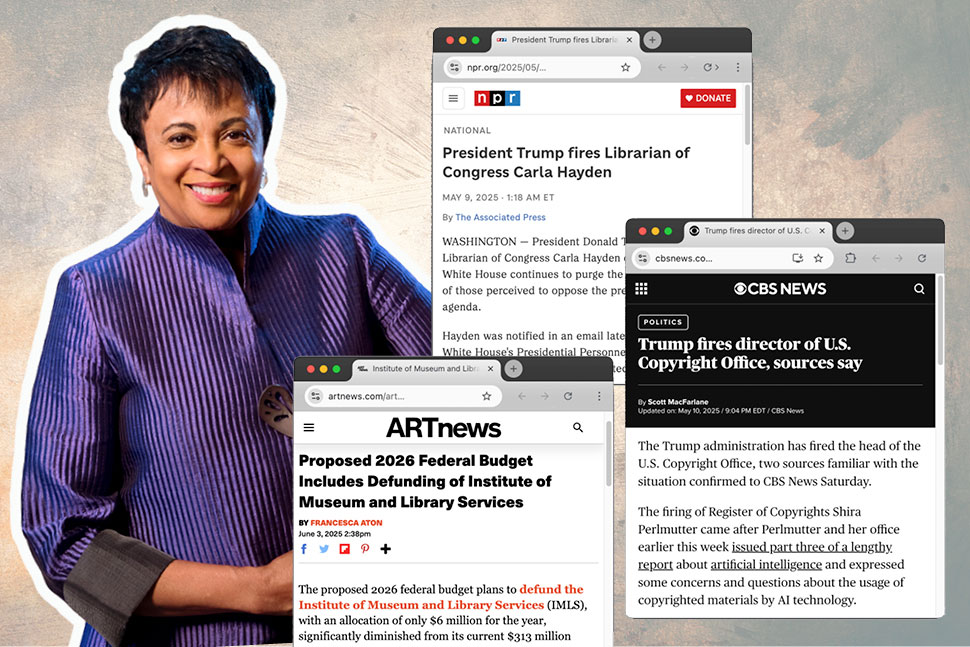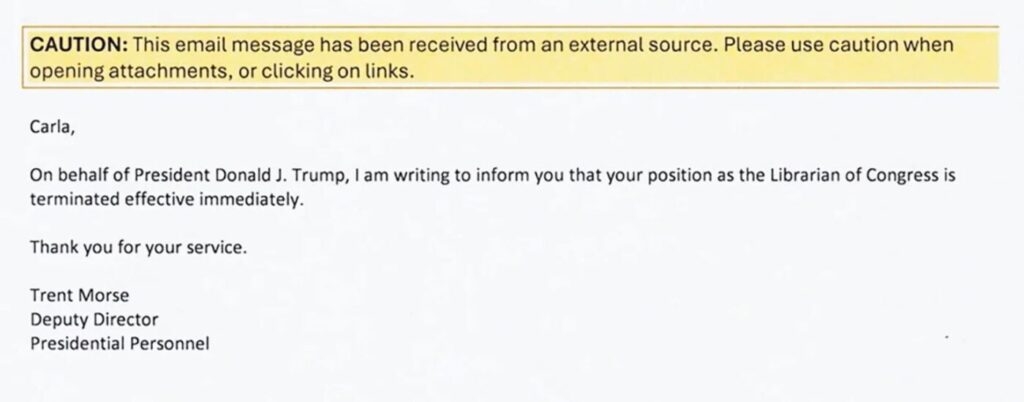Five Months into the Trump Presidency

Since our last report, libraries have continued to experience significant upheaval from President Trump’s actions. In May, the Trump administration fired Librarian of Congress Carla Hayden and Register of Copyrights Shira Perlmutter. We also saw legal cases challenging the administration’s defunding of the Institute of Museum and Library Services (IMLS) continue to make their way through the courts in May and June. Meanwhile, library advocates contacted their legislators to fight for federal library funding in fiscal year (FY) 2026.
Here are several updates on the attacks against libraries across the US and the ways in which library supporters are pushing back.
Hayden fired
On May 8, Hayden learned in a two-sentence email from the Trump administration that she had been fired from her position as Librarian of Congress. On June 8, in Hayden’s first interview since her dismissal, she told CBS News Sunday Morning that she had not received any further explanation from anyone in the Trump administration before or after the email.

White House Press Secretary Karoline Leavitt publicly cited a reason for Hayden’s firing: “We felt she did not fit the needs of the American people. There were quite concerning things that she had done at the Library of Congress in the pursuit of DEI and putting inappropriate books in the library for children.”
The Library of Congress remains a research library and national repository of information about the US, not a lending library. Hayden said in the CBS interview, “When I heard those comments, I was concerned that there might not have been as much of an awareness of what the Library of Congress does.”
The dismissal also brings up questions related to separation of powers, as, while the president appoints the Librarian of Congress, Congress must confirm the appointment and the Library itself sits within the legislative branch, not the executive branch. After Hayden was dismissed, Robert R. Newlen, principal deputy librarian, took over as acting Librarian, in accordance with the Library’s succession rules. The following week Trump appointed Deputy Attorney General Todd Blanche to the role. In a May 12 email to staff regarding who should replace Hayden, Newlen wrote, “Congress continues to engage with the White House, and we have not yet received direction from Congress about how to move forward.”
The American Library Association (ALA) and other organizations have condemned Hayden’s termination. The firing follows a pattern of the Trump administration dismissals of heads of US cultural institutions. Archivist of the United States Colleen J. Shogan was fired from the National Archives and Records Administration in February. On May 30, Trump announced on social media that he had fired Kim Sajet, director of the National Portrait Gallery, part of the independent Smithsonian Institution—though it was disputed whether he had the authority to do so. Sajet announced on June 13 that she had decided to step down.
“Democracy is under attack,” Hayden told CBS. “Democracies are not to be taken for granted. And the institutions that support democracy should not be taken for granted. And so, that’s what the concern is about libraries and museums.… Libraries have been called one of the pillars of democracy, that you have these institutions in every community that allow anyone to come in and access knowledge.”
CBS Sunday Morning, June 8; ABC-7 (Chicago), May 12; AP News, May 16; Publishers Weekly, May 13; ALA, May 9; AP News, Feb. 26; Politico, May 30, June 13
Register of Copyrights dismissed
On May 10, the Trump administration fired Shira Perlmutter, Register of Copyrights at the US Copyright Office. The Copyright Office—part of the Library of Congress—manages US copyright claims and ownership, provides copyright information to the public, and provides impartial expertise to Congress on copyright issues. Perlmutter had been appointed by Hayden.
Trump fired Perlmutter almost immediately after she released a prepublication report on the legality of artificial intelligence (AI) training that uses copyrighted works, which found that fair use does not apply in all cases. Wired notes, “The report was highly anticipated in Silicon Valley, as a number of big tech companies are currently embroiled in dozens of court battles over the legality of their approach to training AI tools on copyrighted materials. In most of these cases, the AI companies are arguing that fair use doctrine makes it legal for them to train on copyrighted materials without permission.”
Perlmutter is currently suing the administration on the grounds that the legislative branch, not the executive branch, has the authority to hire and fire employees of the Library of Congress.
CBS News, May 10; TechCrunch, May 11; Wired, May 12, Dec. 19, 2024; NPR, June 6
Judges weigh in on IMLS
On May 6, a judge granted an injunction in State of Rhode Island. v. Trump, a case brought by several state’s attorneys fighting the dismantling of IMLS. As part of the injunction, withheld funds have been disbursed to several states, allowing canceled services to be restored. For example, Maine State Library was able to retain five employees who otherwise would have been let go because of a lack of funds. In South Dakota the state library was able to restore interlibrary loan service.
On June 6, in ALA v. Sonderling, a lawsuit brought by ALA and the American Federation of State, County, and Municipal Employees, a judge declined to prevent further cuts to IMLS while the case proceeds.
Publishers Weekly, May 6; WMTW-TV (Portland, Maine), May 28; South Dakota Searchlight, June 5; ALA, June 6
Budget slashed
The Trump administration’s proposed federal budget for FY2026 not only calls for the elimination of all IMLS grants but also the elimination of the office itself. The proposed budget gives IMLS $6 million to handle the closing.
With IMLS’s proposed elimination, many of the programs reinstated as a result of the injunction in Rhode Island v. Trump continue to be at risk. Tribal libraries are particularly at risk, since they rely on federal funding more heavily than other types of libraries. More than 100 libraries on federally recognized tribal land have seen their grants cut, leaving tribes across the country with major deficits to the library resources that they can provide, including the ability to preserve the culture of the tribes they serve.
Libraries in states such as Montana and South Dakota could lose access to databases and other resource platforms that are most affordable when provided by the state, which can negotiate a more competitive price.
In many states, libraries face dual threats of reduced local budgets and the loss of IMLS funds. In Indiana, where the library budget is set to be reduced by millions over the coming years, many resources may no longer be available and many libraries will have to reduce hours. In Ohio, rural libraries in particular have similar concerns about reduced funding.
Meanwhile, during ALA’s Fund Libraries campaign, library advocates used ALA’s online tools to dispatch more than 25,000 emails and phone calls asking legislators to support federal funding for libraries in FY2026. Advocates can continue to take action through the resources on ALA’s Show Up for Our Libraries page—from a how-to guide for writing to local newspapers to printed material templates to hand out in communities.
ARTnews, June 3; NBC News, May 11; KBZK-TV (Bozeman, Mont.), May 1; South Dakota Public Broadcasting, May 1; Daily Journal (Franklin, Ind.), June 1; The Ohio Newsroom, May 12; AL: The Scoop, June 3
Source of Article